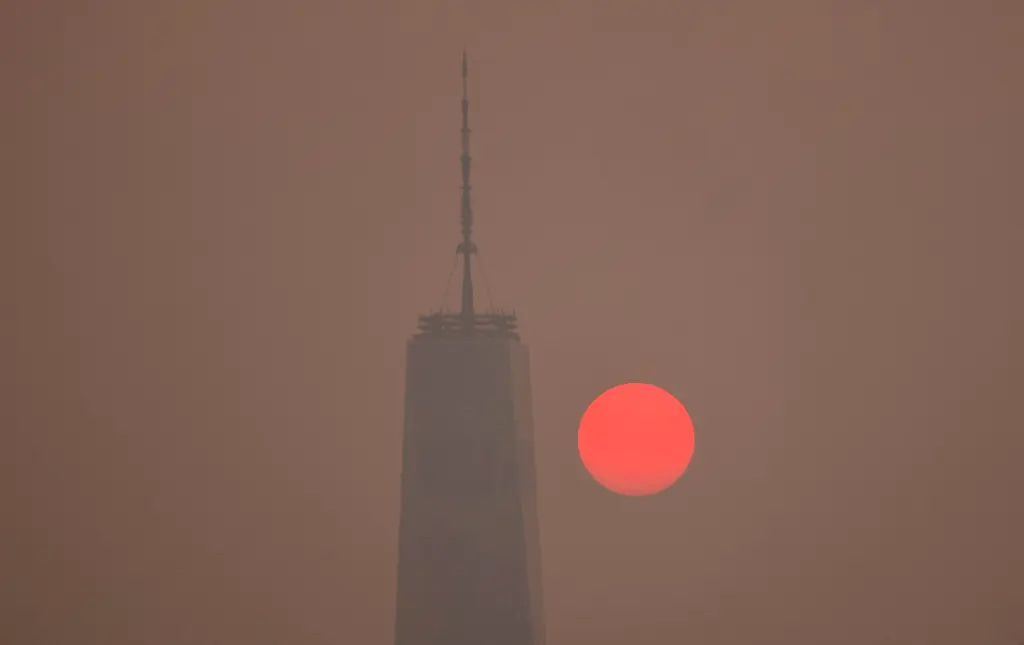
New York City’s air was more polluted than all but two of the world’s major cities Wednesday as thick smoke from wildfires burning hundreds of miles away in Canada was set to continue to choke much of the Northeast through the weekend.
An ominous orange haze crept over the city for a second day as all five boroughs were placed under an Air Quality Health Advisory until Thursday morning due to wind patterns pushing smoke south from over 150 forest fires in Quebec — 110 of which have been deemed out of control.
“Unhealthy” air and smoky conditions are expected to linger over the five boroughs until Sunday, as Mayor Eric Adams on Tuesday urged New Yorkers with heart or breathing issues to “limit … outdoor activities to the absolute necessities.”
By Wednesday afternoon, only New Delhi, India, and Dhaka, Bangladesh, had worse air than the city, according to the website IQair, which tracks pollution levels.
“We’ll be in this same kind of weather pattern through today, and tomorrow as well,” Fox Weather meteorologist Stephen McCloud told The Post. “By Sunday night we should start to see improvement as a new storm system from the west approaches and starts to move this storm system out.”



“Once that storm system from the west starts to come in, it’s going to change the wind direction. Once the wind direction changes, the smoke will not be able to come down into parts of the Northeast and mid-Atlantic,” he added.
New York City’s air quality index — which measures pollution from 0 to 500, with higher numbers being worse — improved incrementally Wednesday morning, dropping from 164 to 158 within a few hours, according to IQair.
It was on par with Toronto, Canada, which also suffered from a haze of southern-drifting wildfire smoke.
But factors such as wind speed and direction could cause the smog to thicken in the Big Apple later in the day, officials warned.






“While conditions are anticipated to temporarily improve later tonight through tomorrow morning, they are expected to deteriorate further tomorrow afternoon and evening,” Adams said in a Tuesday evening statement.
At 10 p.m. Tuesday, air quality in parts of the Big Apple had reached a “very unhealthy” level, according to the Environmental Protection Agency’s index, and the air quality in the five boroughs was the poorest of any major city in the world, according to IQ Air.
Even as New York City sits under a dystopian fog, the worst of the situation is being reported in Pennsylvania and Delaware, according to McCloud.
“The upper-level winds are bringing smoke into the Northeast and mid-Atlantic states. That’s why we’re seeing so much smoke. While the fires are occurring in Quebec and Ontario, that smoke is all just coming straight down,” McCloud said.


The most recent fires near Quebec have been burning for several days, the most intense of which has caused the province’s largest town to issue an evacuation order. The blazes have been exacerbated by “extremely dry” conditions and warm temperatures.
Additionally, smoke and haze from fires as far as British Columbia and Nova Scotia have moved downstream into the city since late May, though the recent influx of smoke from Quebec was far more severe than in previous weeks.


Fires in Canada have charred a combined area that is larger than Maryland and displaced tens of thousands of people, officials said.
The Canadian capital of Ottawa, which neighbors Quebec, had an air quality in category 10+ on Tuesday, the worst level on Environment Canada’s Air Quality Health Index, indicating “very high risk.” Ottawa was not included on the list of cities measured by IQair.
A code red warning was in effect in parts of upstate New York near Canada, meaning even people without health conditions may be at risk from the smoke.


New York state is recommending that residents consider limiting strenuous outdoor physical activity to reduce the risk of adverse health effects.
“Those who are sensitive to air quality or may suffer from allergies, asthmatic folks, may have more health problems than those who do not,” McCloud said, adding that New Yorkers should limit their time outside, if possible.
“Trying to limit your time outside so that you’re not breathing in all this smoke. I mean, it’s not going to be fatal, but it is something that could possibly make you sick.”
Source: NY Post
CLICK HERE TO JOIN OUR WHATSAPP GROUP
CLICK HERE TO JOIN OUR WHATSAPP GROUP
CLICK HERE TO JOIN OUR WHATSAPP GROUP
CLICK HERE TO JOIN OUR WHATSAPP GROUP
CLICK HERE TO JOIN OUR WHATSAPP GROUP
CLICK HERE TO JOIN OUR WHATSAPP GROUP
Advertise with the mоѕt vіѕіtеd nеwѕ ѕіtе іn Antigua!
We offer fully customizable and flexible digital marketing packages.
Contact us at [email protected]
















